 Gain insight into the impact of Zoom Dysmorphia on self-image and learn effective strategies for understanding and overcoming this phenomenon. Learn how to navigate the challenges of virtual meetings and embrace self-acceptance in the digital age.
Gain insight into the impact of Zoom Dysmorphia on self-image and learn effective strategies for understanding and overcoming this phenomenon. Learn how to navigate the challenges of virtual meetings and embrace self-acceptance in the digital age.
Let’s have a conversation about something you might not have heard of – but is becoming more of a problem in our digital age.
It’s called Zoom Dysmorphia. No, it’s not a new feature on your video conferencing app. It’s an unexpected side-effect of our current, virtual-everything lifestyle.
What exactly is Zoom Dysmorphia?
Zoom Dysmorphia is when you become extra aware of how you look – because of the increase in screen time on Zoom – coupled with the distortion created by front-facing cameras and bad lighting – all of which often don’t capture us at our best.
If you’re someone who has been known to struggle with body image and self esteem, Zoom can trigger these challenges.
You can become extra fixated on your appearance during every video call, nitpicking perceived flaws and feeling less than your fabulous self.
But no worries! Coming up, I will delve into the concept of Zoom Dysmorphia and unravel why it stings our self-esteem.
Plus most importantly, I will share empowering ways to overcome Zoom’s harmful effects on your self esteem around your appearance.

(Note: Throughout this article – and down below – you will see a range of image quote posters with the quote: “I’m not beautiful like you. I’m beautiful like me.” I created these quote image posters because I’m passionate about helping women to feel more confident in their skin – and to embrace who they uniquely are.)
My Own Struggle With Zoom Dysmorphia
I felt compelled to explore this topic of Zoom Dysmorphia because I’m someone deeply familiar with the problems of body dysmorphia.
I’m a bestselling wellness author, recovered binge eater and and founder of the therapist recommended Stop Emotional Eating Course.
I personally understand how body dysmorphia can lead to emotional eating – and other eating disorders – because it did that for me – in my own life – for far too many years.
And so I personally understand the many vulnerabilities people might struggle with when they see themselves on Zoom.
In fact, I started noticing my own personal discomfort when seeing my own image staring back at me on the screen. It felt like a fresh type of body dysmorphia. I’d be in a Zoom meeting, and suddenly notice a tiny flaw on my face. Or I’d think I saw the beginnings of a double chin. I’d try to ignore it and focus on the meeting.
But after the Zoom call, I’d feel a bit more self conscious about my appearance.
And because I’m a recovered emotional eater, I’m deeply aware of how body dysmorphia can trigger emotional eating (and other eating issues). So I began to research Zoom Dysmorphia – for both myself – and for my Stop Emotional Eating Course Students.
Well, as it turns out, I’m not alone in feeling this way about Zoom. A lot of people are now confessing to struggling with Zoom Dysmorphia.
As our lives increasingly intertwine with on camera Zoom conversations, it’s important to understand how virtual meetings can affect our self perception. We need to be aware of how Zoom’s high-definition video quality and pesky camera angles can play tricks on our minds – distorting the reality of our appearance – thereby harming our self esteem.
How Zoom Dysmorphia Impacts our Mental Health
Research reports that Zoom Dysmorphia has been affecting a lot of people’s mental health – triggering self-esteem issues, intensifying body dysmorphia, and leading to anxiety, insecurity and depression.
 For example…
For example…
- Researchers at Ghent University found that increased screen time can lead to lower self-esteem and symptoms of depression. This study specifically blamed the continuous confrontation with our own image on video calls.
- A study published in the Facial Plastic Surgery & Aesthetic Medicine journal took a deep dive into “Zoom Dysmorphia.” The study examined how our new reliance on video conferencing apps (yes, Zoom, I’m looking at you) is leading to a negative shift in self-perception – and an increase in people seeking plastic surgery.
- Another study in the International Journal of Women’s Dermatology in 2021 identified a significant uptick in people seeking cosmetic procedures due to increased self-scrutiny from video-conferencing. In the study people were complaining about how they looked tired, distracted, or “off” on their video calls.
- Researchers at Stanford University found that constant self-evaluation during video meetings was creating a lot of stress and anxiety. You know how tiring it can be to have all-day meetings? Well, it turns out that Zoom meetings are even more exhausting. This research suggests that the high level of “self-focus on camera” during video calls is leading to what’s been coined “Zoom Fatigue” – where people start to feel more tired and stressed from constantly seeing themselves on screen.
Basically, both dermatologists and psychologists alike are reporting what they call a “Zoom Boom” in patients – where they are seeing more people coming to them – feeling concerned about their appearance because of Zoom.
A surprising reason we feel extra critical of our appearance on Zoom
We might also feel extra critical of our appearance on Zoom due to what’s called the “mere-exposure effect.”
This psychological phenomenon was discovered by social psychologist Robert Zajonc. It explains that people tend to develop a preference for things merely – because they are familiar with them.
- Well, we humans are used to seeing ourselves in the mirror (a reversed image).
- We are not used to seeing ourselves us as we truly look (non-reversed) on Zoom.
- And this non-familiarity with how we look (non-reversed) can lead to discomfort and self-criticism.
Overcoming Zoom Dysmorphia
Here are a few strategies that can help you to manage Zoom Dysmorphia – as well as its accompanying Zoom Fatigue.
1. Foster Self-Love and Compassion
Let’s start by going easy on ourselves. Perfection is an illusion. Everyone has flaws. Embrace your unique traits and shower yourself with kindness and appreciation for the wonderful person that you are. Regularly repeat empowering “I am” affirmations – in particular right before a Zoom call! Or write daily gratitude lists – loaded up with things you love about yourself.
2. Be Authentically You
Remember, the camera doesn’t always tell the truth. It’s like a fun-house mirror that can distort reality. Stop comparing yourself to others and embrace what makes you uniquely attractive. Or go ahead and choose a filter that makes you feel more comfortable. Or simply schedule an audio only call. Zoom offers those options too!
3. Dress Confidently
What you wear can have a significant impact on your confidence. Choose an outfit that you feel great in, something that truly represents your personal style.
4. Take Breaks
Don’t forget to log off from time to time. Spend time on activities that help you relax, feel happy and boost your confidence. Your mental health deserves a breather!
5. Celebrate Your Accomplishments and Your Core Values
Redirect your focus from your physical appearance to your achievements and core values. What you’ve achieved in life – and who you are as a person – is way more important than how you look on a video call.
6. Seek Support
If you’re feeling overwhelmed, don’t hesitate to reach out to loved ones for a compassionate, fresh perspective. Share your thoughts with trusted friends or family. Plus I can help you to manage your Zoom Dysmorphia by working with you directly on Zoom via one on one Mindset Mastery Sessions. Learn more here!
In conclusion: Zoom Dysmorphia
Zoom Dysmorphia is becoming more common in our increasingly digital lifestyle, and so it is a challenge we need to confront. So it’s important to take some time to understand the issue, acknowledge its effects on your self-image and mental health, and try some strategies to overcome it, so you can navigate this digital age with confidence and positivity.
Remember, you’re more than your appearance on a video call. You’re uniquely you. And beauty comes in many shapes and forms.
With this in mind… Here are more of those self-love focused quote image posters I designed.
I’m Not Beautiful Like You. I’m Beautiful Like Me.

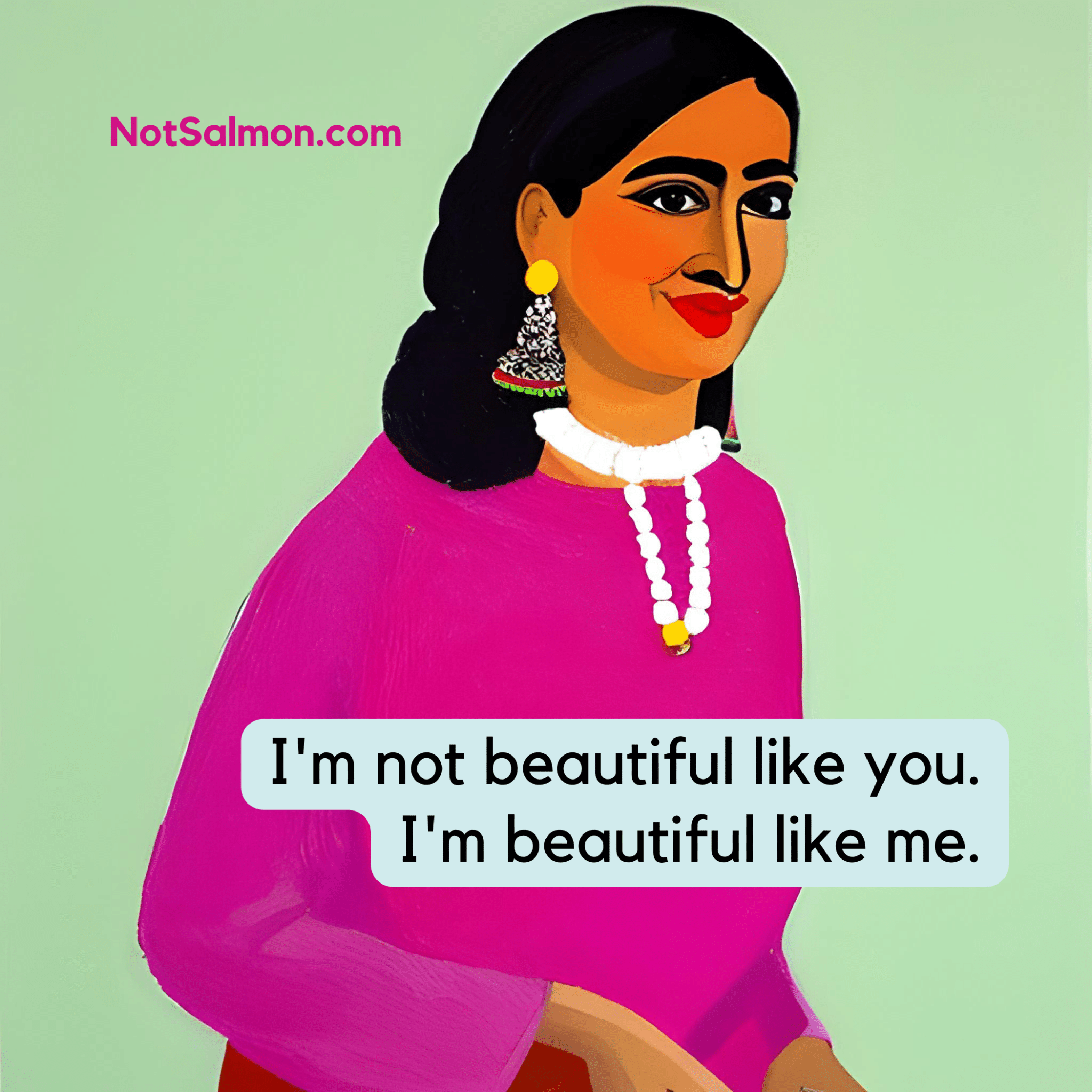
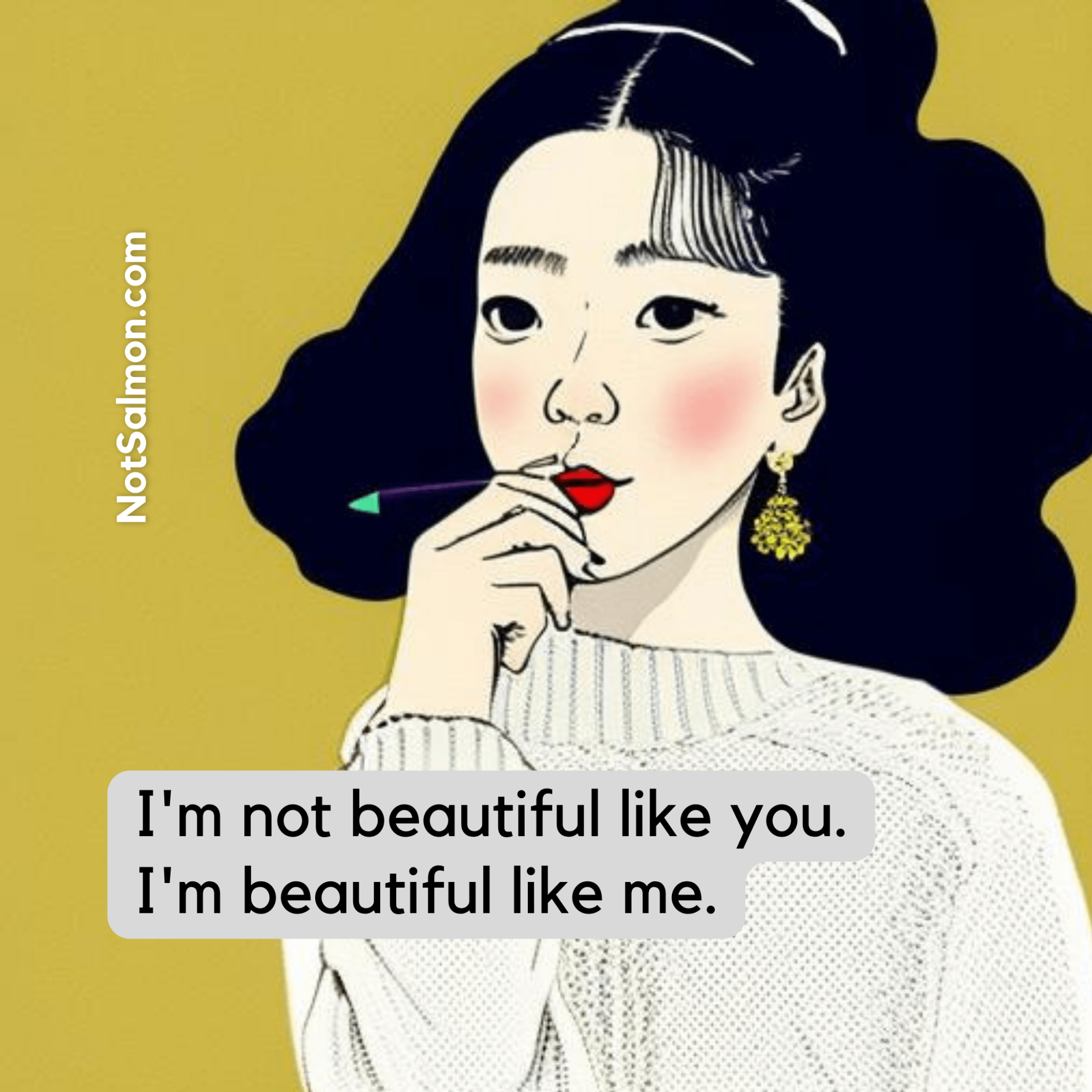

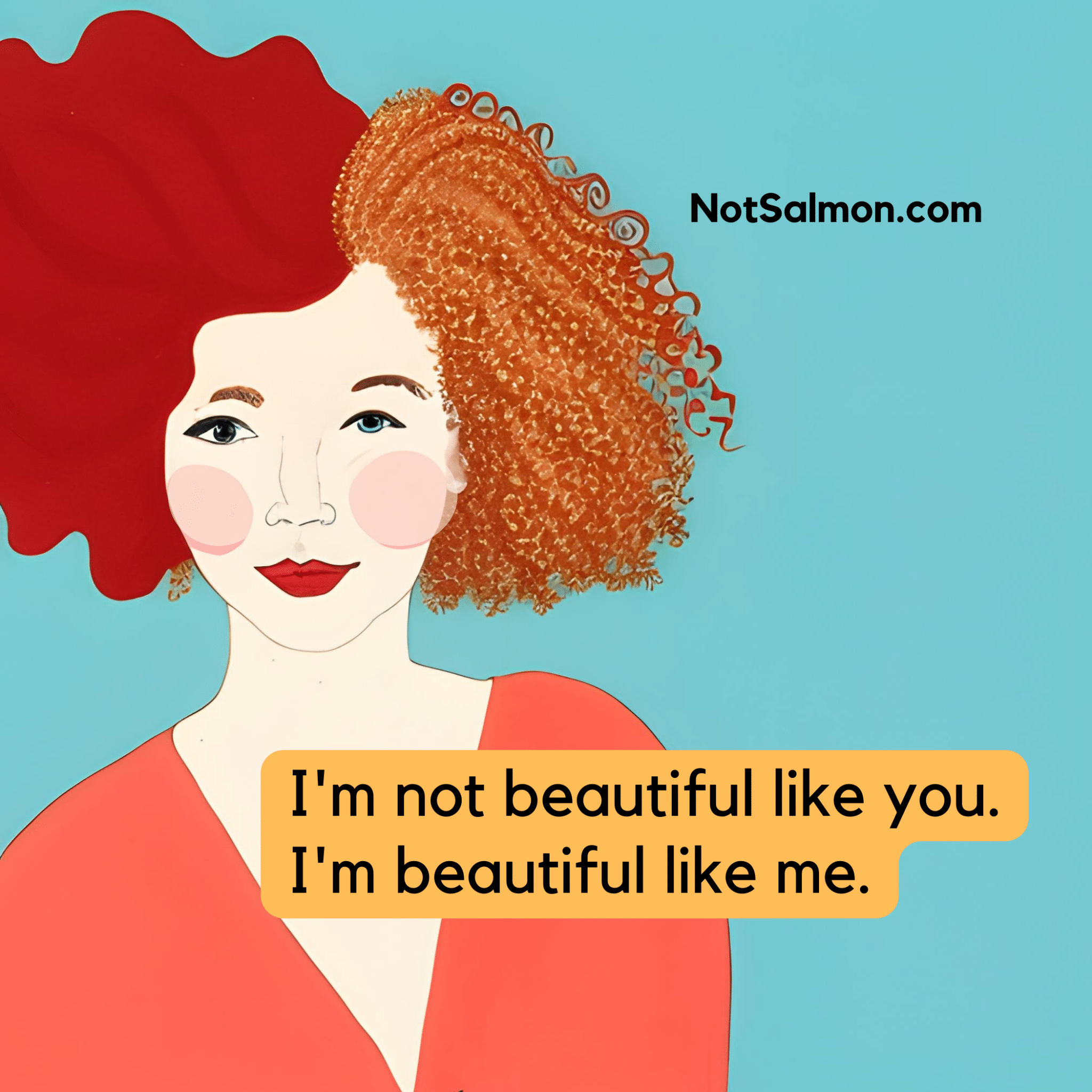
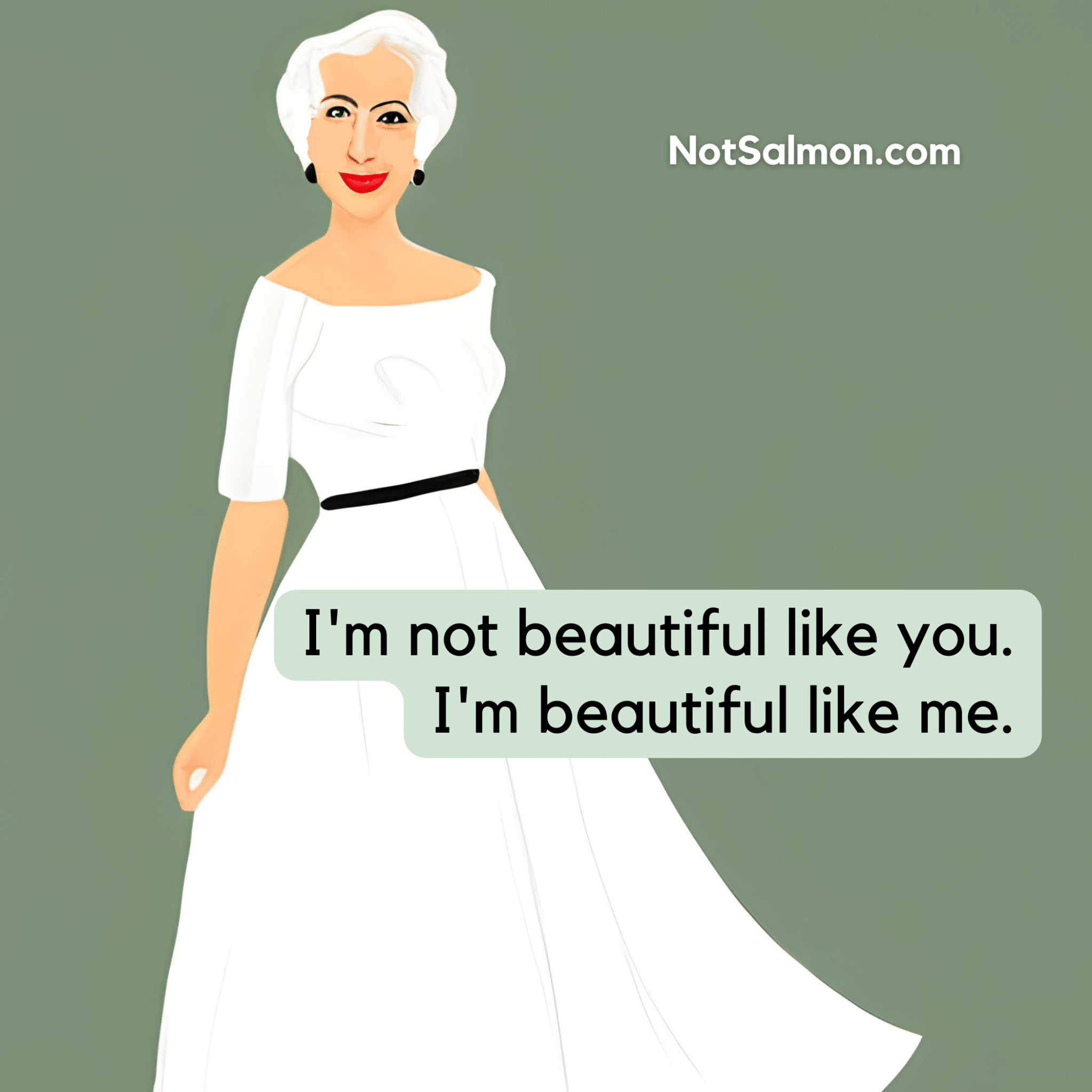



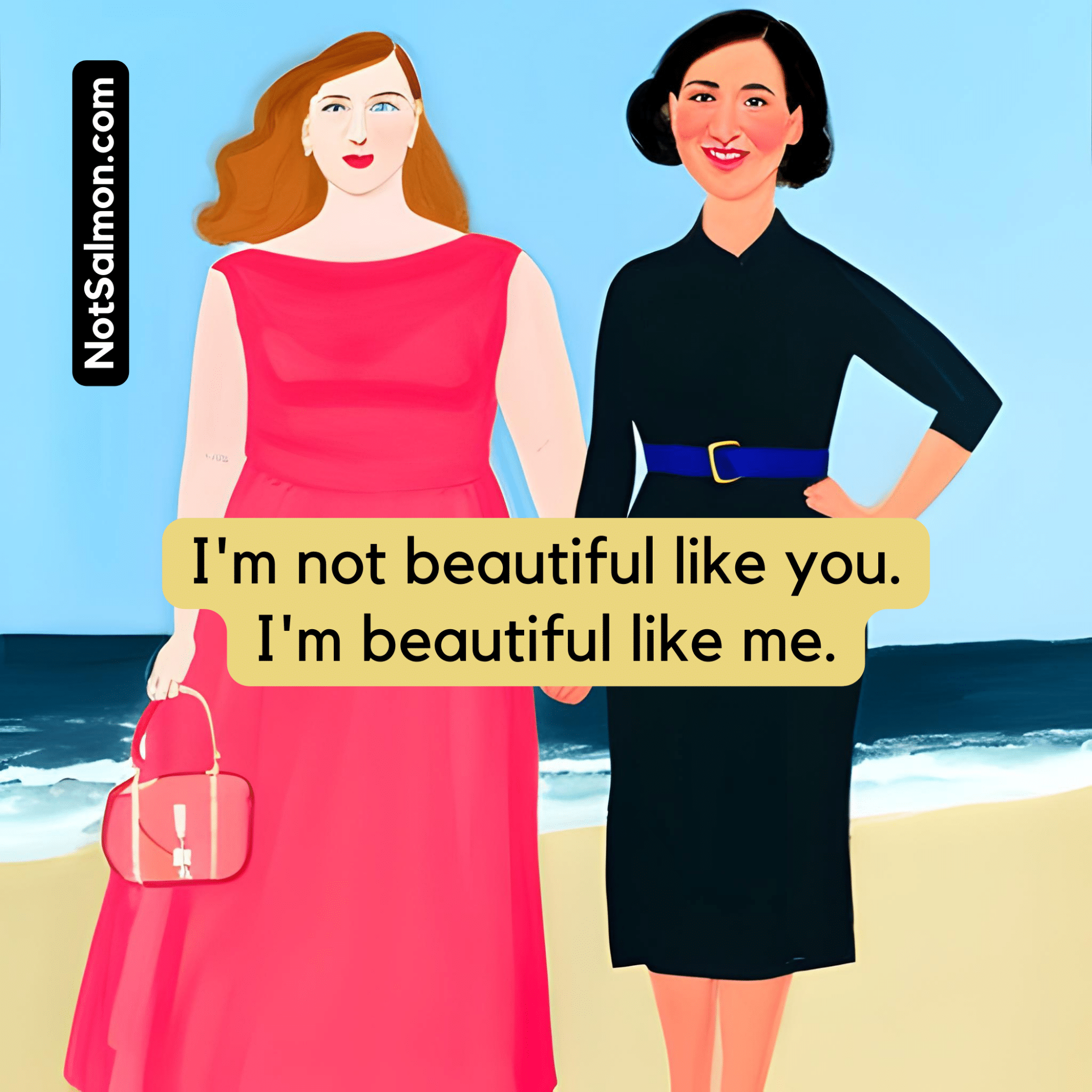
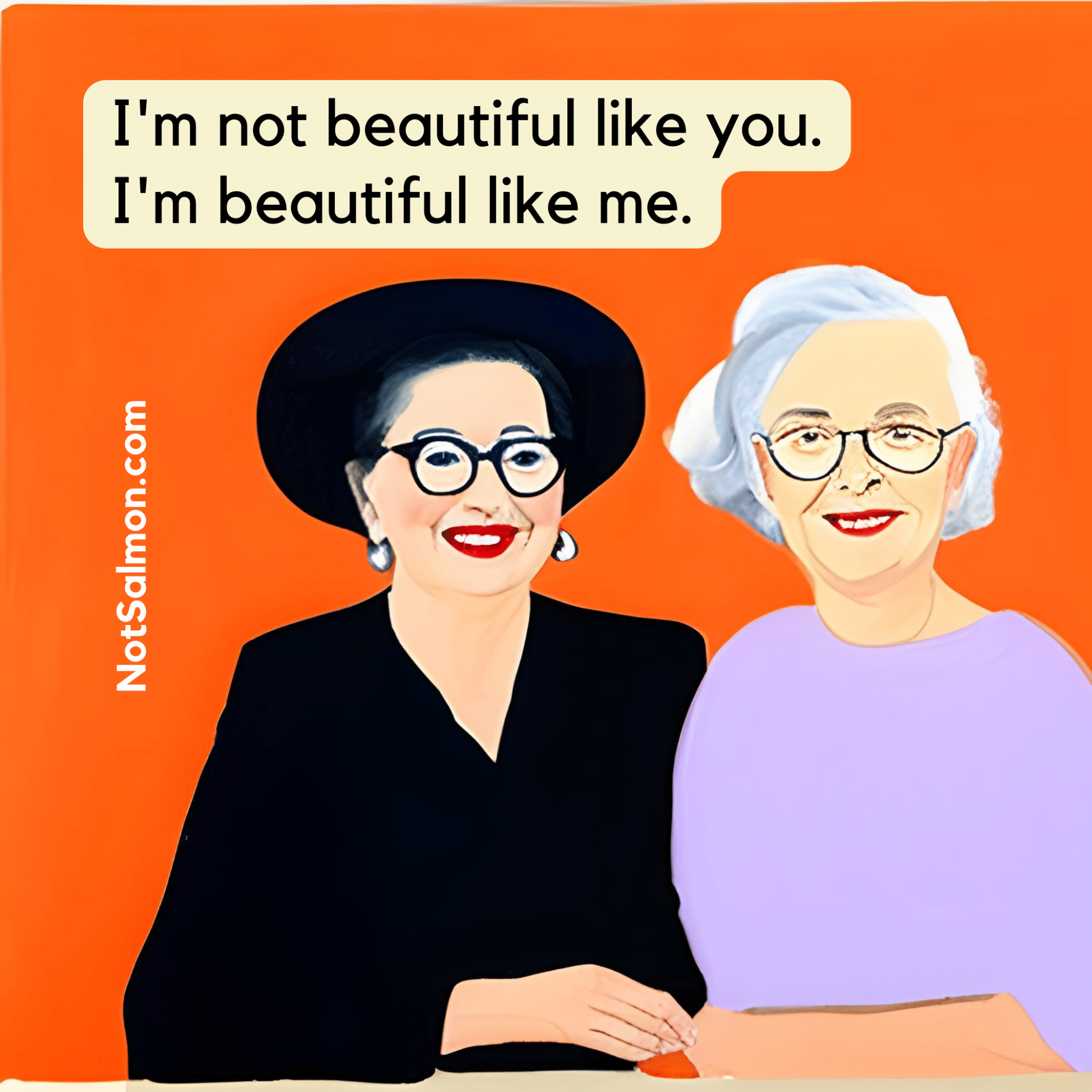

Life Your Healthiest and Happiest Life
Explore my research based and health boosting online program… >>>The Stop Emotional Eating Course!
P.S. Before you zip off to your next Internet pit stop, check out these 2 game changers below - that could dramatically upscale your life.
1. Check Out My Book On Enjoying A Well-Lived Life: It’s called "Your To Die For Life: How to Maximize Joy and Minimize Regret Before Your Time Runs Out." Think of it as your life’s manual to cranking up the volume on joy, meaning, and connection. Learn more here.
2. Life Review Therapy - What if you could get a clear picture of where you are versus where you want to be, and find out exactly why you’re not there yet? That’s what Life Review Therapy is all about.. If you’re serious about transforming your life, let’s talk. Learn more HERE.
Think happier. Think calmer.
Think about subscribing for free weekly tools here.
No SPAM, ever! Read the Privacy Policy for more information.
One last step!
Please go to your inbox and click the confirmation link we just emailed you so you can start to get your free weekly NotSalmon Happiness Tools! Plus, you’ll immediately receive a chunklette of Karen’s bestselling Bounce Back Book!


 Gain insight into the impact of Zoom Dysmorphia on self-image and learn effective strategies for understanding and overcoming this phenomenon. Learn how to navigate the challenges of virtual meetings and embrace self-acceptance in the digital age.
Gain insight into the impact of Zoom Dysmorphia on self-image and learn effective strategies for understanding and overcoming this phenomenon. Learn how to navigate the challenges of virtual meetings and embrace self-acceptance in the digital age.
 For example…
For example…











